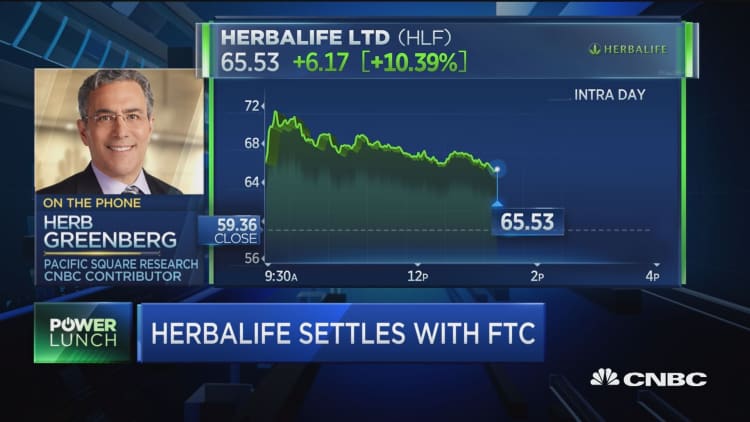
After a brief respite, short-sellers are piling back into Herbalife.
In the wake of an agreement the dietary supplement firm reached with the Federal Trade Commission, skepticism is rising over whether Herbalife is out of the woods. Traders had been covering their short bets ahead of the ruling released Friday, but are re-establishing their positions, according to financial analytics firm S3 Partners.
"There was apprehension in the shorts, and they were actually closing down their positions in anticipation of the FTC report," said Ihor Dusaniwsky, S3's head of research. "Once that happened, they actually read it and understood what [the report] said, they bounced back."
Initial reports ahead of the official release were that the FTC had cleared Herbalife of being a pyramid. In fact, the report never made that specific distinction, and commission officials sharply criticized the company's business practices.
Herbalife has been in the news thanks largely to a high-profile war that hedge fund manager Bill Ackman has waged against the company. With a billion-dollar short in play, Ackman has contended that the company is engaged in a pyramid scheme where its representatives benefit more from recruiting new distributors than from actual sales.
In a statement Friday after the ruling, Ackman said that "while it appears that Herbalife negotiated away the words 'pyramid scheme' from the settlement agreement, the FTC's findings are clear."
Ackman declined Tuesday through a spokesman to comment further. Herbalife officials did not immediately respond to a request for comment.
Shares have risen consistently since early 2015, notching a gain of nearly 20 percent in 2016. The stock saw a rapid spike Friday after the FTC report, but has cooled since and was down more than 1 percent Tuesday afternoon. And the shorts have lingered.
Herbalife over the past three years:
Since the FTC decision came down, about $125 million in new shorts have come in, including $70 million into the close Friday, according to S3. The dollar level of shorts is nearing $1.6 billion, which Dusaniwsky said is the highest level since July 2014, a year during which Herbalife shares lost about half their value. That has happened even though the cost to borrow shares for shorting is about double for Herbalife — at close to 1 percent annually — than typical.
In fact, he said there soon may be a scarcity of shares for lending to short sellers, though there still remain a few million available. Short sellers borrow stock for a fee, then sell and agree to repurchase at a later date in hopes of pocketing a profit after shares fall.
"Next week is going to be important," Dusaniwsky said. "If this continues on rates are going to get more expensive to put your shorts on. We're going to start running out of stock to borrow."
Icahn Capital, headed by Ackman's fellow billionaire hedge manager and sometime-nemesis Carl Icahn, is Herbalife's biggest holder with 17 million shares, or about 18.3 percent of the total available, according to S&P Capital IQ. His shares had a market value of nearly $1.1 billion as of Tuesday trading.
The total level of short interest in Herbalife is around 24 percent of shares outstanding, a number that would rank it near the top of the , though the company is not listed in the index.


